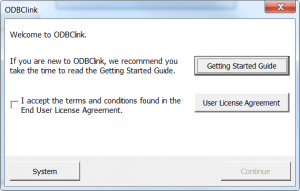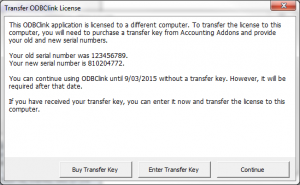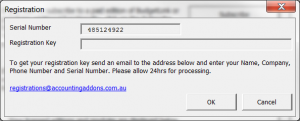Difference between revisions of "Moving ODBClink to a new machine or folder"
| Line 13: | Line 13: | ||
You will need to perform three steps: | You will need to perform three steps: | ||
# Move the ODBClink folder to the new machine | # Move the ODBClink folder to the new machine | ||
# | # Buy a Transfer Key (only if moving to a new machine or hard drive); | ||
# Enter the Transfer Key into ODBClink (only if moving to a new machine or hard drive). | # Enter the Transfer Key into ODBClink (only if moving to a new machine or hard drive). | ||
| Line 30: | Line 30: | ||
# Answer OK to all the standard prompts that display until you get the ODBClink welcome dialogue; | # Answer OK to all the standard prompts that display until you get the ODBClink welcome dialogue; | ||
# On the ODBClink welcome dialogue, check the '''I accept the terms and conditions found in the End User License Agreement.''' and click '''Continue'''; | # On the ODBClink welcome dialogue, check the '''I accept the terms and conditions found in the End User License Agreement.''' and click '''Continue'''; | ||
# Click the ''' | # Click the '''Buy Transfer Key''' button to obtain your transfer key; | ||
# Click '''Continue'''. You can still use ODBClink while you wait for your transfer key. Once you receive your transfer key, proceed to the next step. | # Click '''Continue'''. You can still use ODBClink while you wait for your transfer key. Once you receive your transfer key, proceed to the next step. | ||
Revision as of 19:56, 22 February 2015
Overview
This guide describes how to move ODBClink to a new Location (machine or folder).
How to move ODBClink to a new machine or folder
ODBClink exists as a series of files and folders contained with a main folder. It is secured to a hard drive. In order to move ODBClink to a new location, the main folder must be copied in full to the new location. If moving ODBClink to a new machine or hard drive, you will need to obtain a transfer key. Be aware that costs may apply to request your transfer key.
You will need to perform three steps:
- Move the ODBClink folder to the new machine
- Buy a Transfer Key (only if moving to a new machine or hard drive);
- Enter the Transfer Key into ODBClink (only if moving to a new machine or hard drive).
Step 1: Move the ODBClink folder to the new location
Please follow these instructions to move the ODBClink folder to a new location.
- Locate the ODBClink Folder to move;
- Copy and paste the folder to the new location;
Step 2: Request your Transfer Key
Please follow these instructions to request your transfer key.
- Start ODBClink;
- Answer OK to all the standard prompts that display until you get the ODBClink welcome dialogue;
- On the ODBClink welcome dialogue, check the I accept the terms and conditions found in the End User License Agreement. and click Continue;
- Click the Buy Transfer Key button to obtain your transfer key;
- Click Continue. You can still use ODBClink while you wait for your transfer key. Once you receive your transfer key, proceed to the next step.
Please allow 24 hours turn around time. For faster response times please provide notice of the transfer key request so that we can be prepared to generate it for you.
Step 3: Enter your transfer key
Once you receive your transfer key, follow these instructions to enter it into ODBClink.
- Start ODBClink;
- Answer OK to all the standard prompts that display until you get the Transfer ODBClink License dialogue;
- Click the Enter Transfer Key button;
- On the ODBClink Licensing dialogue, click Enter Registration Key;
- Copy and Paste your Transfer Key into the Registration Key field of the Registration dialogue and click OK;
- Click on the Continue button of the ODBClink Licensing dialogue;
ODBClink should now be useable on the new machine. Be mindful you may need to update your data connection. See Changing how ODBClink connects to your data file for more information.


